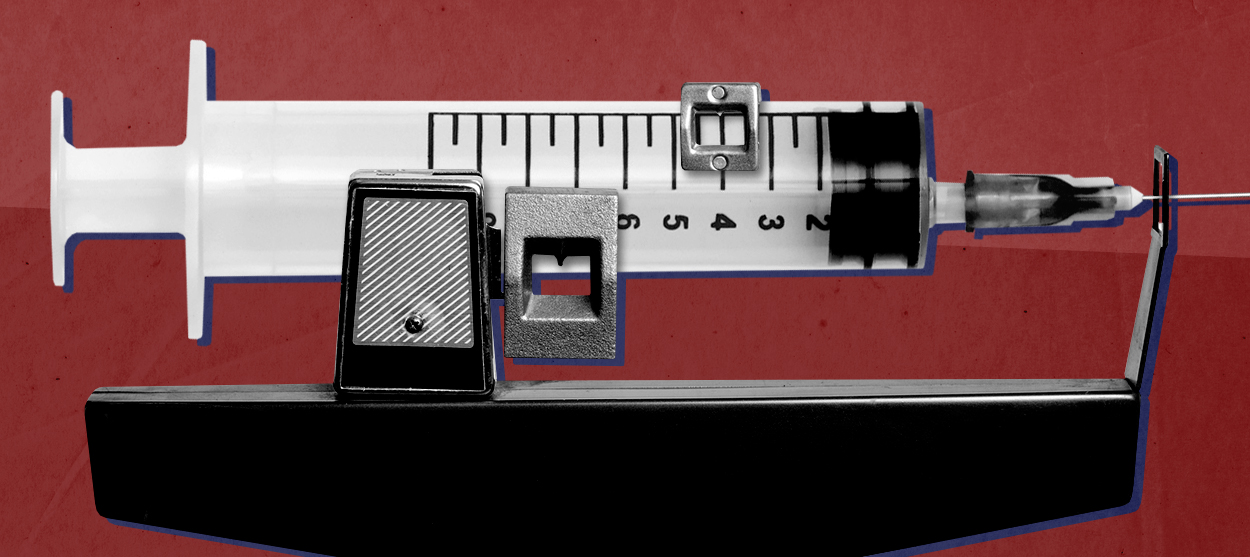Don't make me step on a scale to get the COVID-19 vaccine
Why the vaccine rollout is triggering for people recovering from eating disorders


A free daily email with the biggest news stories of the day – and the best features from TheWeek.com
You are now subscribed
Your newsletter sign-up was successful
The COVID-19 vaccine train is moving, in fits and starts. My social media feed is filling up with photos of Band-Aided biceps. I'm impatient to join the vaccinated brigade — and here in my home state of California, I could be eligible as soon as March 15. But there's a catch: In order to know for sure, I'd have to weigh myself.
Since the start of the COVID-19 pandemic, the CDC has listed "obesity" as one of the primary risk factors for severe illness. Their definition is based entirely on Body Mass Index (BMI), which measures a person's body mass against their body height. Now, states are using the CDC's BMI guidelines as a cutoff for who gets vaccinated when.
I don't recall the last time I knew how much I weighed, but it was several years ago. I remember the number, though; it's etched in my brain. At that time, my BMI was high enough to qualify for the COVID-19 vaccine in some states, but not in California, where the threshold has been set at the top of the CDC's given range.
The Week
Escape your echo chamber. Get the facts behind the news, plus analysis from multiple perspectives.

Sign up for The Week's Free Newsletters
From our morning news briefing to a weekly Good News Newsletter, get the best of The Week delivered directly to your inbox.
From our morning news briefing to a weekly Good News Newsletter, get the best of The Week delivered directly to your inbox.
I know I've gained weight since the last time I looked at a scale. My clothes fit differently; I've sized up in bras and pants; my face has rounded out in photographs. But how many pounds, exactly? And how does that translate to BMI? I've spent years deliberately keeping myself in the dark, learning to think of my body as just a body rather than a collection of numbers. Until now.
There's been plenty of ink spilled about the problems with BMI. It's a blunt instrument at best, allowing for no other considerations of a person's health besides how much they weigh and how tall they are. Even the academics who created and popularized BMI intended it to be used to study overall populations, not to assess an individual person's health. "Obesity," as defined by BMI, is tangled up with racism, sexism, and socioeconomic inequity, not to mention the stigma and substandard treatment that larger-bodied patients often face when seeking medical care.
And there's another problem — one that I've just run headlong into. Research has shown that people who are medically classified as "overweight" or "obese" have high rates of disordered eating behaviors, though we're less likely to receive diagnoses or treatment than our thinner peers. Some forms of disordered eating that go hand-in-hand with higher weight are widely misunderstood, if they're acknowledged at all; for example, binge eating disorder only became a standalone psychiatric diagnosis in 2013.
For many people like me, eating disorder recovery relies on detaching ourselves from the scale — removing numbers like BMI from our consciousness as much as we possibly can. The stress of the pandemic has already made it extraordinarily hard to keep disordered eating at bay; almost everyone I know who plays in this sandbox has struggled or relapsed to some degree. And the explicit linking of BMI and vaccine eligibility means the tough stuff is even tougher.
A free daily email with the biggest news stories of the day – and the best features from TheWeek.com
I want to get vaccinated as soon as I can. I want it so badly that I'm willing to buy into the CDC's use of BMI — a metric I think shouldn't be on their list of risk factors in the first place. Altruistically, I want to do my part to protect those who can't be vaccinated; selfishly, I want to avoid getting sick myself. And I know that if I do become severely ill with COVID-19, I will be at the mercy of a medical system that deals with larger bodies by prescribing weight loss for everything from joint pain to cancer. There's already mounting evidence that fat people who seek medical help for COVID-19 tend to receive more biased, less attentive care.
But none of my options are good. I could bite the bullet and step on a scale, but knowing whether my BMI is above a certain number — let alone what that number is — would distress me for weeks if not months. I could take my chances and sign up without knowing my BMI, but the prospect of being turned away — or, worse, weighed on the spot — is almost as upsetting as just finding out for sure.
And even if I decide to sit this one out for now, the can of worms has been opened. The discourse around BMI and vaccines, and around body weight and COVID-19 in general, isn't going away. My brain seizes on every thinkpiece, every vaccine selfie from a fat friend, and gnaws on them for days. I feel old thought patterns, habits, and impulses creeping back in. The longer this goes on, the more time I have to slide back into the disordered headspace that I've fought so hard to leave behind.
I know I'm not alone. I’m also keenly aware of my own privilege in this, from race to class to even just being on the relatively small end of fat. So-called "obese" Americans are not a monolith, and not everyone is caught on this specific snag. But we are, one way or another, being asked to buy into a medical framework that weaponizes our own weight against us, in order to protect ourselves and our communities.
For those of us already struggling to accept and nourish our bodies as they are, this puts our physical and mental well-being at direct odds. On the one hand, every day spent unvaccinated is another day we spend at risk of getting badly sick with COVID-19. On the other hand, coming forward for vaccination means leaving ourselves open to the shame — both internal and external — that comes with defining our bodies by our BMI. Everyone's calculus is different; mine is complicated, and I haven't found the answer yet.
I don't know when I'll finally be able to share my Band-Aid photo, or what sort of mental-health compromises I'll have to make to get there. As with so much else about the American pandemic experience, the only answer is to muddle forward on our own — haphazardly, the best we can.
Zoe Fenson is a freelance writer based in the San Francisco Bay Area. Her writing has appeared in Longreads, Narratively, The New Republic, and elsewhere. When she's not writing, you'll find her doing crossword puzzles in cocktail bars or playing fetch with her cat.
-
 Book reviews: ‘Bonfire of the Murdochs’ and ‘The Typewriter and the Guillotine’
Book reviews: ‘Bonfire of the Murdochs’ and ‘The Typewriter and the Guillotine’Feature New insights into the Murdoch family’s turmoil and a renowned journalist’s time in pre-World War II Paris
-
 Witkoff and Kushner tackle Ukraine, Iran in Geneva
Witkoff and Kushner tackle Ukraine, Iran in GenevaSpeed Read Steve Witkoff and Jared Kushner held negotiations aimed at securing a nuclear deal with Iran and an end to Russia’s war in Ukraine
-
 What to expect financially before getting a pet
What to expect financially before getting a petthe explainer Be responsible for both your furry friend and your wallet
